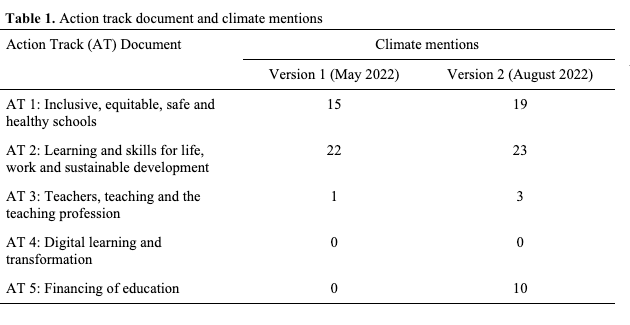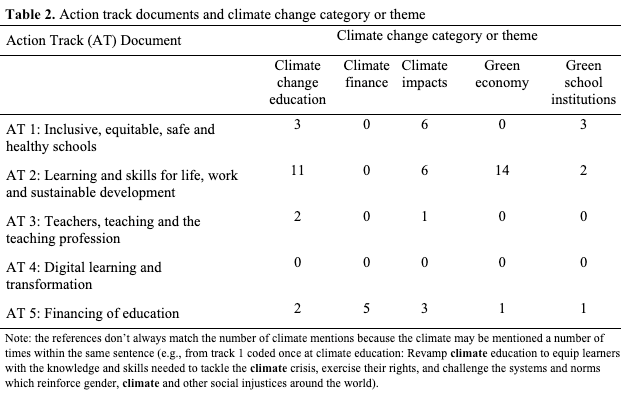Climate Action
Transforming Education Through Climate Action
September 15, 2022
A Call for Climate Literacy at the United Nations Transforming Education Summit
The Transforming Education Summit
The UNESCO Transforming Education Summit (TES) will take place September 16th -19th at the UN Headquarters in NY. According to UN Secretary General Antonio Guterres, the summit “will seek to renew our collective commitment to education and lifelong learning as a pre-eminent public good.” The summit is the culmination of a year-long set of national consultations, pre-summit events, and online discussion. The summit will focus on an ambitious, transformative global education policy roadmap focused on five thematic action tracks.
EARTHDAY.ORG and its Global Education team celebrates the elevation of transformative education and life-long learning across formal, non-formal, and informal sectors. However, the climate crisis increasingly threatens the foundational social and technical infrastructure of education spaces with considerable impact on teaching, learning, and socio-emotional well-being. At TES, any transformative education plan must prepare teachers, learners, and citizens to be climate literate and equipped with the values, knowledge, and skills for an uncertain future. EARTHDAY.ORG and colleagues including the Global Partnership for Education, FCDO, Brookings Institute, Education International, the Learning Planet Institute, UNESCO, the Malala Fund, the Education Commission, the Education Outcomes Fund, and Boston Consulting Group are demanding world leaders to acknowledge and recognize the important and transformative role of the education sector in climate mitigation, adaptation, restoration, and action.
A review of the Action Tracks and Thematic Discussion of Climate in Education
To understand the intersection of climate change and TES, EARTHDAY.ORG’s global education team reviewed the thematic action track discussion papers versions 1 (released in May 2022) and 2 (released August 2022) (Table 1). We searched and recorded the climate or climate change mentions within the documents. Climate change was noted most frequently in action track 2 (Learning and skills for life, work and sustainable development). Importantly, the most significant change between versions came in Action Track 5 (financing of education), where the revised text was amended to make a “compelling case that education systems should receive a fair share of climate finance” (p.6,12).

A more detailed analysis sought an explanation of how the most recent discussion papers framed climate change across the action tracks (Table 2). We grouped the discussion into five categories:
- Climate Change education: teaching and learning about climate change and climate action.
- Climate Impacts: the impact of climate change such as natural disasters, conflicts, refugees, and so forth.
- Climate finance: the need for education to receive finances allocated for climate change responses.
- Green school institutions and infrastructure: school infrastructure (energy matrix, building materials, transportation services, etc.), school nutrition supply changes, and other aspects of the built environment.
- Green economy and job training: The role of education in creating and preparing citizens for the green economies of the future.

The results indicate important takeaways. First, four of the five action tracks recognize the need for educating students about climate change, a recognition of climate impacts, and the opportunities available for just transitions to a green economy. Second, there is no discussion at all within action track four and the links between digital learning and climate action, despite the vital role digital learning will play should climate catastrophe disrupt schools. Finally, while action track two’s emphasis on skills for the green economy is important, one must also consider the role of transformative education programs to create a cadre of civically minded and politically active citizenry to make demands on household, school, community, and national decision makers.
TES as a moment for transformative education on climate action
On September 19th at TES, world leaders have a unique opportunity to articulate their commitments to leveraging the education sector to adaptation, mitigation, and preparedness for an uncertain climate future. World leaders will be given 4 minutes to state their commitments to transforming education. EDO, Youth organizations, and others demand a recognition that any commitment to education transformation must include a commitment to climate action and climate literacy. In fact, any transformative education policy agenda must consider the social and environmental impacts of climate change.
EARTHDAY.ORG hopes TES can be a launching point for ongoing dialogue between the education and climate communities. EARTHDAY.ORG is organizing a first of its kind education-focused pavilion at COP 27 in Sharm El-Sheikh, Egypt in November 2022. COP 27 builds upon our climate literacy campaign which united more than three hundred million signatories from more than one hundred countries calling for a global commitment to climate literacy for all learners, everywhere.
Finally, to quote Secretary General Guterres again, ‘We are here because the world is facing a grave climate emergency. Climate disruption is happening now, and it is happening to all of us. (…) We are in a battle for our lives. But it is a battle we can win.”
Transformative education is an important weapon in the battle against climate disruption.